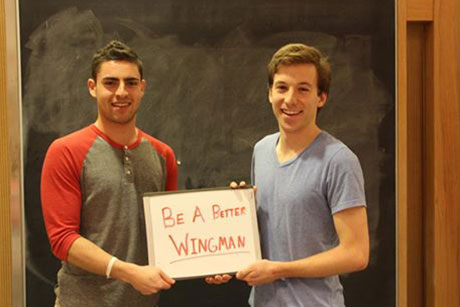Cornell Perspectives: Wingman 101 shifts violence discussion

What’s being done at Cornell to address sexual violence? A series of articles will present firsthand accounts from those who are on the front lines of the issue in our community.
The first installment, “Wingman 101: Cornell Men Shifting the Paradigm,” features Matthew Laks ’15 and Brian Harwitt ’15, facilitators for “Wingman 101,” a program managed by Gannett Health Services Health Promotion. Established seven years ago, Wingman 101 aims to engage undergraduate men in the prevention of sexual violence by encouraging them to identify risky social situations and take responsibility for being proactive bystanders.
Matthew: Getting involved with Wingman has definitely opened my eyes to how big this issue is. Coming from high school, I didn’t know anything about sexual violence. It bothered me to hear that people aren’t always comfortable going out – that they don’t feel safe in their community and don’t feel safe at school because of these problems.
The second semester of my freshman year I pledged a fraternity, and one of my fraternity brothers talked to me about the Wingman program. I saw this as a great way to get involved with Cornell in an unconventional way and really have a positive impact on the community at large.
The way [Wingman 101] works is that we create a conversation. It’s not about us teaching or lecturing – there’s no PowerPoint; there are no handouts for people to read; there are no videos. We like to say that it’s “bros talking to bros” about these issues.
At the beginning of the program, we always ask: “What do you guys think a wingman is?” And the typical answer is, “Oh, it’s a guy who helps you get with a girl.” What’s really interesting is that at the end of our program, we ask the same question again and what we find is that the men will say that it’s somebody who looks out for their friend or their brother to make sure that they’re making the right decisions, to be an active bystander, and to be willing to intervene in a situation if necessary. Getting that shift in thinking is exactly what we’re all about.
The goal of Wingman 101 is to give men the tools, in realistic ways, to intervene in certain situations and feel comfortable about it. There are always options. Guys can be direct and ask if someone needs help, or they can distract – for example, by going up to a couple and asking if they want something to eat. They can also discreetly find the friends of the individual and ask them to step in.
Brian: If you can just break the momentum, for a second, and give the people who might be at risk a moment to think about what they’re doing, that could be the difference between a sexual assault happening or not. If someone is extremely intoxicated, and you say, “Hey man, you don’t look too good, I think you should just go to bed, or sleep on the couch over here,” or something like that – it could make a difference. Alcohol plays a huge part in this issue.
Matthew: A lot of the time, guys don’t want to get in the way of their other guy friends, right? So, really, the main tool is confidence – the confidence to speak out, the confidence to encounter a potentially awkward situation, and to know that they may actually be preventing something really bad from happening.
Brian: Matt and I had a conversation with someone in a sorority on campus, and she said a lot of women in her chapter have suffered traumatic and emotional events from unwanted but consensual sexual encounters. This deserves attention, too, because it can cause harm as well. Helping guys to understand that pressuring someone to engage sexually is not ok needs to be a bigger part of the conversation.
That’s why we say it’s the responsibility of the community. It’s up to us to be the ones to regulate ourselves. It’s on us. It’s incredibly important to have everyone on board to make sure that they’re creating a safe environment for everyone.
Matthew: It’s about everybody who is a student here at Cornell trying to look out for one another. That’s really what it’s about.
If you are interested in applying to become a Wingman facilitator, send an email to cuwingman@gmail.com. You can also like us on Facebook.
For resources and information about sexual assault at Cornell, visit the Sexual Harassment and Assault – Response and Education website.
Media Contact
Get Cornell news delivered right to your inbox.
Subscribe